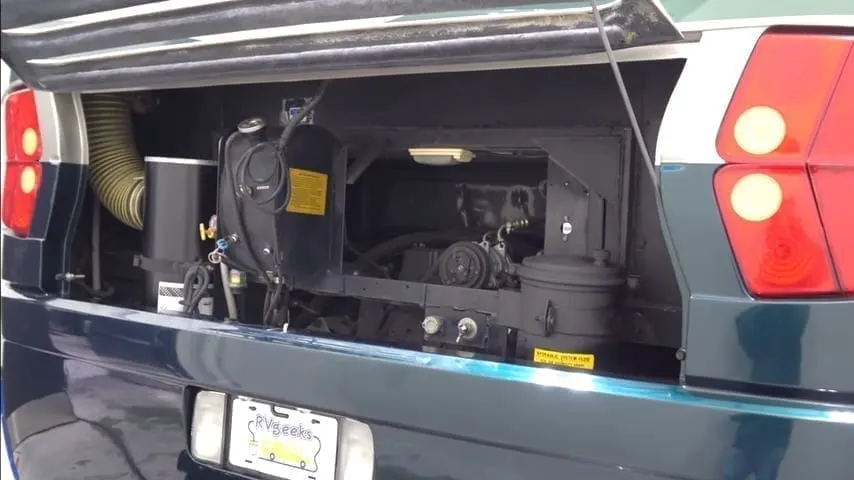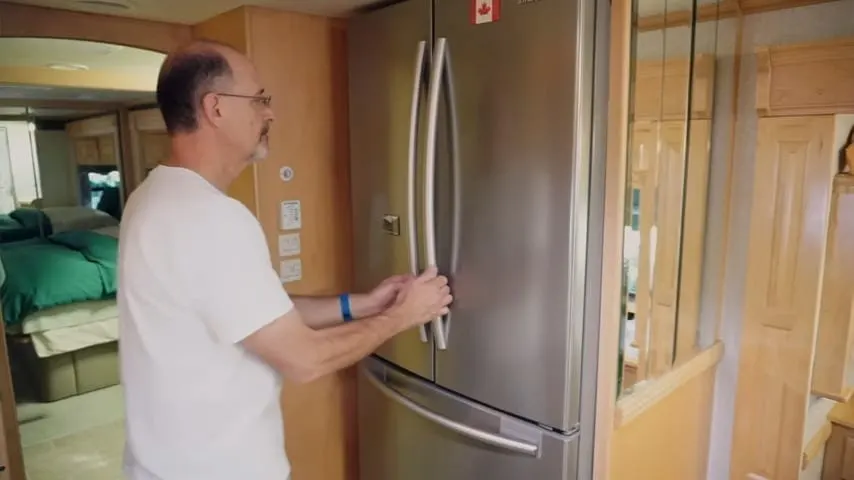Diesel or gasoline? It’s one of the oldest debates in the recreational vehicle industry. Which is better, and why? Today, we’re taking a deeper look at the benefits of diesel class A motorhomes – what makes them stand out, their fundamental differences, and more.
- 1) What Is a Diesel Class A Motorhome?
- 2) What Does Diesel Pusher Mean?
-
3)
Benefits of Diesel Class A Motorhomes
- 3.1) More Torque
- 3.2) Better Braking & Air-Ride Suspension
- 3.3) Quieter Cockpit in Diesel Pushers
- 3.4) Can Pull More Weight
- 3.5) Lasts Longer
- 3.6) More Efficient with Better Fuel Mileage
- 3.7) Less Frequent Maintenance
- 3.8) Larger Motorhomes Mean More Storage and Interior Room
- 3.9) More Luxury and Amenities Than Gasoline Motorhomes
- 4) Are Diesel Class A RVs Better Than Gasoline?
What Is a Diesel Class A Motorhome?
As the name implies, a diesel class A motorhome runs on diesel fuel, as opposed to gasoline. Some diesel class A RVs are front-engine models, and others are rear-engine, better known as diesel pushers.
Diesel Class A RVs are generally larger in both length and weight, and typically come with more luxury amenities than gasoline motorhomes.
What Does Diesel Pusher Mean?

Our Class A motorhome is a diesel-pusher, which means its diesel-powered engine is in the motorhome’s rear.
Diesel pusher is slang for a rear-engine diesel Class A motorhome. This name comes from the fact that the diesel-powered engine is in the motorhome’s rear, essentially pushing the RV down the road rather than pulling it.
Benefits of Diesel Class A Motorhomes
There are many benefits of diesel class A motorhomes. From more power to (typically) more luxury amenities, let’s take a look at them here:
More Torque
Torque is a measure of an engine’s rotational force, but it can be referred to in layman’s terms as ‘pulling power.’ Diesel engines produce more torque than gasoline engines. This is especially helpful for driving in the mountains, pulling a tow vehicle, and handling all the weight and amenities that usually come in a larger RV.
Better Braking & Air-Ride Suspension
Diesel RVs have air braking and air suspension. You’ll have a much smoother ride when it comes to suspension and braking in diesel RVs than you will in their gasoline-powered counterparts.
Quieter Cockpit in Diesel Pushers

The diesel pusher’s engine is in the back of the rig offering a much quieter and more enjoyable ride for drivers and passengers.
Diesel pushers’ engines are in the motorhome’s rear, resulting in a much more comfortable ride than a front-engine RV. The engine’s roar is so loud in many gasoline RVs that it can be difficult to have a quiet conversation or listen to music. With a diesel pusher, the engine noise stays in the back.
Can Pull More Weight
Diesel engines are stronger and can tow more than gasoline engines. A class A diesel pusher’s towing capacity is typically between 10,000 and 15,000 pounds, while its gasoline counterpart is more likely to be limited to an average of 6,000 to 8,000 pounds, with some maxing out at 10,000 pounds.
Lasts Longer
Diesel engines can easily last twice as long as their gasoline-powered counterparts, if not longer. A diesel engine’s higher compression ratios, efficient burn rate, and lubricating properties improve the engine life significantly. Along with their higher torque and towing capacity, this is why diesel engines are so well suited to heavy-duty truck applications.
More Efficient with Better Fuel Mileage
Diesel fuel burns much more efficiently than gasoline, and diesel fuel contains about 10% to 15% more energy. Consequently, a diesel class A RV can go about 20% to 35% farther on a gallon of fuel compared to a gasoline RV.
Less Frequent Maintenance
Diesel engines usually require less frequent routine maintenance than gasoline engines do (although as an RVer, you may reach the time interval for maintenance before reaching the mileage interval). Although maintenance and repairs on diesel engines are usually more expensive, the RV’s engine will likely need fewer repairs. Diesels are built to go the distance, again, another reason why they’re ideal for trucking applications.
Larger Motorhomes Mean More Storage and Interior Room
Since diesel class A RVs can handle more weight, the RVs usually have considerably more interior space for both living and storage. Also, diesel Class A RVs usually have ample exterior storage in bays along the bottom of the coach for more camping gear than you could possibly need! That’s because the chassis that a diesel RV is built on is typically a raised-rail chassis, which allows for basement storage that spans from side-to-side (typically called pass-through storage).
More Luxury and Amenities Than Gasoline Motorhomes

Class A diesel motorhomes offer space for all the luxurious comforts of home like this full-sized residential refrigerator.
Diesel RVs are more expensive and usually more luxurious. In a diesel class A motorhome, you’ll often find the best of everything – design elements, upholstery, cabinetry, countertops, flooring, tech, lighting, fixtures, washer and dryer, residential fridges, and much more. All are made possible by the increased carrying capacity of the larger chassis and robust power a diesel engine provides.
Are Diesel Class A RVs Better Than Gasoline?
Here we have one of the ultimate debates in the RV world: Are diesel class A RVs better than gasoline RVs?
If you’re considering the torque, ride comfort, efficiency, and luxury of a diesel class A RV, the answer would be a resounding yes. But as with most things, all of those upgrades come at a higher price point. Diesel RVs cost more to purchase and maintain than gas rigs. So it’s up to each individual RVer to determine if those added benefits are worth the extra cost.
If you plan to live full-time in your motorhome, and/or if you plan to drive a lot of miles (particularly in mountainous terrain), the benefits of a diesel motorhome may outweigh the added cost. But if you’re planning to be a weekend warrior… or only travel seasonally… that extra cost may not be worth it to you, and a gas class A motorhome could be a better fit.
Are diesel RVs for everyone? Absolutely not! The perfect RV for you will depend on your lifestyle and budget. Just because many people will tell you that diesel RVs are better doesn’t mean they’re best for you.
Geek Out with Us Every Week
Join our newsletter to learn about all things RV-related. Every week we offer free tips, tricks, product reviews, and more to our online community of RVers. Whether this is your first time on the road or you’re a seasoned expert, we’d love for you to geek out with us!


Dave Densmore
Saturday 27th of March 2021
As the owner of a gas coach, one of the advantages of a diesel coach that is rarely mentioned is being able to use truck lanes at a truck stop to fuel. Our gas motorhome is medium sized at 31', but when we're towing a car, it can still be a pain getting in and out of a gas station. You best be paying attention. There's not many gas stations that have the pump islands parallel with the street anymore.
The Chevy 454 (7.4L), 8.1L, Ford V10 and the new 7.3L motors are truck motors. They're known for long life when properly cared for.
I find it curious the way that Ford increased the towing capacity on their later model motorhome chassis while still running the V10.. Makes me suspicious it had more to do with advertising that true capability.
Buy what you can afford, keeping the cost of regular maintenance and unexpected repairs in mind. It can get substantial. We like our class A, but haven't been able to get out near as much as we thought we were going to, life got in the way. By cost factor, I think we would've been better off with a towed unit and it's simpler maintenance, but it's hard to get past the panoramic view from that huge windshield, and the "vacation" or "special travel" feeling that we get because we're not in a daily driver.
TheRVgeeks
Saturday 27th of March 2021
Good point about the faster-fueling, Dave. That is, indeed, a benefit of a diesel RV (though it's often offset by the significantly larger fuel tank). Oddly, even with that perk, we prefer NOT fueling at truck stops. They tend to be MUCH messier (no offence to truckers, but they're clearly not the cleanliest bunch, LOL!) with diesel fuel dripped/spilled everywhere. And the price at truck stops is almost always the highest around (even when you factor in some of the discount programs). It's definitely more work (lots of time spent on GasBuddy and Google Maps with street & satellite view) to find non-truck-stop stations we can fit in (and we have an unfair advantage since Peter was a professional driver, so isn't afraid to take our 43' RV in places others fear to tread), but it works for us. And, yes, we do have to sit and wait longer for the fuel to pump, since standard stations RARELY have high-speed pumps/nozzles... but we're not in a hurry, usually. ;)
Richard Hubert
Friday 26th of March 2021
JOHN SCHRETLEN = re: CA Diesel emissions checks - Yes, California has proposed a requirement that all Diesel RVs entering the state have to be smog checked, and certified - every year! - before being allowed into the state. Of course they will charge for it, even though it is only a really quick check of plugging in the OBD meter to see if there are any emissions faults. If none - you are OK, but if any found then you must have repairs done or leave the state. But I also do not think this has actually passed as law - yet. Sure you will hear lots more about this on all the RV internet sites.
As to it's impact on tourism and trucking - good observation. CA has already gone after Diesels - greatly impacting, and upsetting - the trucking and shipping industries. For example - in 2015 they started requiring that older diesel trucks had to replace their engines with newer models. This even applied to some diesel boats docked in CA ports. Apparently they even have some requirements for ships coming into CA ports.
The Port of Long Beach is the busiest port in the country, receiving many containers (mostly from Asia) which then get transported all over the US. What they realized was that the ships coming into port emitted lots of Diesel exhaust, as did all the trains which then headed East carrying all these containers. So they have gone after shipping (not sure about trains) to reduce this pollution. Trouble is, it did not stop there and so they are now going after all diesel vehicles of all types.
Now its hard to argue against cleaner air - but everything comes at a cost, and with trade-offs. As a long term CA resident I have learned that many CA politicians are oblivious to un-intended consequences of their actions, and I think you are correct in assessing that the impact of requiring an annual smog certification of all Diesel RVs coming into the state will strongly discourage many. Even if their diesel RV is clean - the cost and annoyance of having to do this will keep some away from the state. And not even sure how the State plans to enforce this. We will see.
Richard Hubert
Friday 26th of March 2021
Good, balanced article.
As full timers for the last 3 years in a 38' Winnebago Gasoline model we have learned that what we did right was buy a good used, but top end model which has lots of luxurious features. Maybe not all those mentioned.above which many Diesels have, but we were able to buy it at a very good price, leaving money in the budget to go to Lithium batteries, more solar, do some upgrades, etc.. It has enabled us to travel back & forth across the US - to all 4 corners yet with enough power to still pull our Toad along.
Would we ever get a Diesel? Probably yes if we came into some real $$ with which to do so. But the point is that even with a smaller budget going with a gasoline motorhome still enables all the travel anyone could desire.
Thanks!
TheRVgeeks
Saturday 27th of March 2021
Absolutely, Richard! There is no one-size-fits-all answer when it comes to RVing... what's perfect for one person/couple would never work for another. Thankfully, there are MANY ways and MANY options for people to enjoy RVing. So glad you found what works for you and are out there enjoying!! Safe travels!
Tony
Friday 26th of March 2021
Excellent and balanced article on the pros and cons of a DP. We have a 43' DP and spend at least 4 months on the road. We like the power that allows us to easily tow our Rubicon and driving the coach is very comfortable. We enjoy the creature comforts a big coach has aboard that make long trips more enjoyable. Having a dishwasher, stacking washer and dryer, central vacuum, make "living" a lot less of a chore. I'm occasionally in envy of smaller RVs that can be towed places we can't go, but I wouldn't want to trade the amenities that come with our big bus.
TheRVgeeks
Saturday 27th of March 2021
Glad you're happy with your choice, Tony. We, too, love our diesel pusher for all of the same reasons... the creature comforts really make our full-time living quite comfortable. And, like you, we sometimes are envious of the greater maneuverability (and availability of sites that fit) smaller RVs. But it's fleeting. LOL!
Drew
Friday 26th of March 2021
Hi Guys,
I think for the benefit of your readers I should contribute something. Although it's true diesels usually have much more amenities and generally nicer ones as well, there's a big trade-off. In this article I think you partially covered this but I'll put the magnifying glass on it for a minute. The maintenance schedules for all the workings on a typical diesel chassis is much more involved than that of the gas versions. All of that costs a lot of money. Unfortunately, many diesel owners have been victims of break downs due to the complicated nature of the systems those rigs have- especially post-emission ones that were built after 2009. I'm sure you've seen stories about this on many forums. A typical diesel owner should follow a builder's maint. regimen as closely as possible to help avoid some of the events but some are unavoidable. I think you guys take excellent care of your rig and that's what's necessary for a good long life and pleasure using your rv. Although it's true that a diesel engine should go a long time before it's done, I see many more new diesels on the road these days than older ones. Owner's generally trade them in long before any life-ending engine trouble shows up. In addition, even though the engines are capable of going a long way- the house portion of the rv would probably deteriorate a lot sooner. The argument about fuel mileage is almost awash. Diesels these days are only getting slightly more mileage than gas ones, and this is funny- why would any motorhome owner complain about fuel mileage? There's one thing I can't argue about...no smog checks on diesels. For me, I have to get my rig smogged every two years...an extreme rip off in my State of Ca. There's a little cloud on the horizon though. Our State wants to have all diesel rv's smogged in the near future, even ones from outside Ca. visiting here. We'll see what happens with that.
TheRVgeeks
Saturday 27th of March 2021
All good points, Drew. And we recently saw an article talking about California looking to implement smog checks for even out-of-state RVs. Can certainly understand WHY they'd want to do that, but boy-oh-boy what an impediment they'll be creating for tourism. We're watching that development very closely... we LOVE California (so beautiful), but having to get smog checked/permitted to visit is going to make us (and many others, we assume) consider other choices.
JOHN SCHRETLEN
Friday 26th of March 2021
"Our State wants to have all diesel rv’s smogged in the near future, even ones from outside Ca. visiting here. We’ll see what happens with that."
Darn, first I've heard of this. I have a 2010 DP without the DEF system and take care of it. If CA decides to put diesel vehicles to the smog test I sure hope that they consider the ramifications of the tourist industry and the trucking industry.
As for the maintenance schedules on a DP. Yes, more involved and some things are just not DIY friendly - like changing tires or oils. Even lubing all the chassis bits really ought to be done by professionals with the proper tools. Or, at the least, an owner with the garage and tools and according to the chassis manufacture specifications.